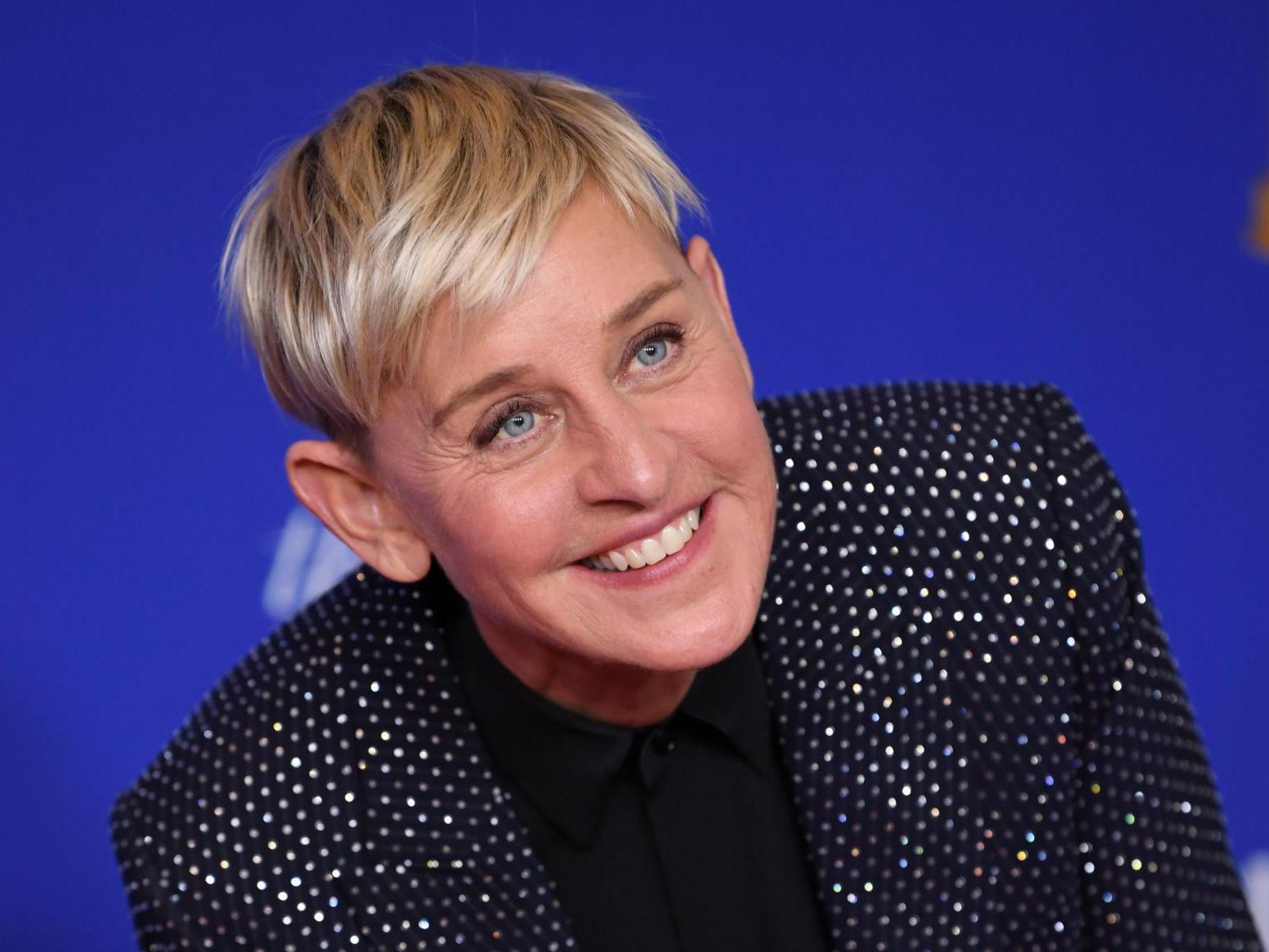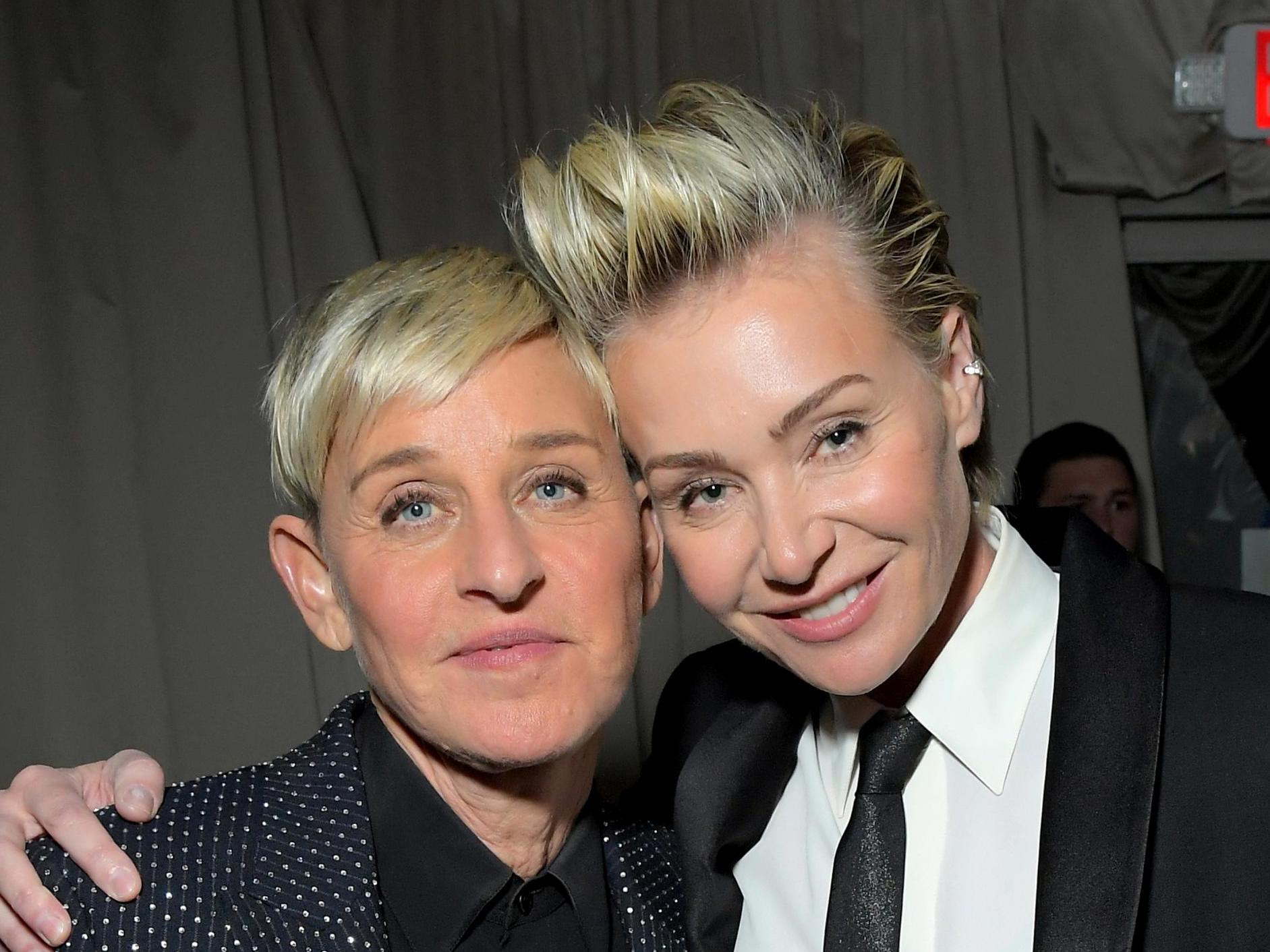How Ellen DeGeneres and her beloved talk show came crashing down to earth
America’s queen of daytime TV has been in hot water of late, and now her show is headed permanently off-air. Adam White charts her extraordinary and brave rise to the top – and where it all started to go wrong


No one knows for certain whether we changed, or Ellen DeGeneres did. On screen, at least, America’s queen of daytime television niceties remained consistent. Since the debut of her self-titled talk show in 2003, she has been cute, folksy and resolutely inoffensive. A-listers flocked to her sofa because they knew they wouldn’t be given a hard time. Her comic persona has always been light and observational, no cracks of angst or comedic hostility. And yet somehow, in the last two years, she became one of the most controversial celebrities in America.
The news that DeGeneres is ending her talk show after 19 seasons, which came just months after an investigation into allegations of toxicity behind the scenes, wasn’t a surprise. The comedian and TV personality had been publicly weighing up its end for years. But it’s unfortunate that it’s come to a close quite like this, with DeGeneres’s reputation far messier than it once was, and the star admitting that she was sent into a “tsunami” of grief and sadness as the allegations against her mounted.
“When it started, with that stupid ‘someone couldn’t look me in the eye’ or whatever the first thing was, it’s like a crest of a wave,” she told The Hollywood Reporter. “Like, ‘This isn’t going to be that big of a wave.’ And then it just kept getting bigger and bigger until it was out of control. And I really, honestly, felt like, ‘I don’t deserve this. I don’t need this. I know who I am. I’m a good person.’”
As if she were cursed by a vengeful witch at some point in 2019, DeGeneres has been trailed by career woe after career woe in recent years. Today, she exists almost as a conduit for our collective frustrations with the world, or a canvas upon which we can express our want for karmic justice. Where once her abject niceness was seen as a good thing, it’s now her greatest foe, perceived as a crafty illusion masking celebrity vapidity and elitism.
DeGeneres, of course, isn’t an actual villain or a mastermind of dastardly wrongheadedness. In the grand scheme of things, her alleged crimes have been minor. She’s been accused of being mean to restaurant staff and handymen, stiffing on tips, asking people not to look directly at her, and taking her eye off the ball while sexual misconduct and bullying allegedly occurred on her set. All seem to clash with a television persona made up of compassion, cheer and calls for kindness. Her moral stances have also been consistently misguided of late, but also not surprising for an incredibly wealthy celebrity who has exclusively palled around with other wealthy celebrities for the last 25 years. Still, we seem to have collectively decided she is evil.
What is interesting about DeGeneres is that she’s tried to be the least objectionable person in America since the early days of her fame. It’s just never quite worked out that way. In the mid-1980s, she found minor fame as a stand-up comedian after performing a set on Johnny Carson’s US talk show where she joked about fleas. More stand-up, and occasional acting work, followed in the aftermath, with DeGeneres one of the most successful benefactors of a boom in comedian-driven sitcoms launched in the wake of Seinfeld. Ellen, her eponymous star vehicle, was as pleasant and inoffensive as its leading lady. She even had a brief fling with movie stardom, playing a lonely singleton who marries a psychopath in the tonally adrift (and, in hindsight, hilariously titled) romcom Mr Wrong.
Mr Wrong flopped, potentially because it couldn’t survive speculation about DeGeneres’ sexuality. Throughout the 1990s, it was widely assumed that DeGeneres was gay, but she had been reluctant to confirm or deny it publicly. In 1997, when she chose to come out as a lesbian on the cover of Time Magazine (“Yep, I’m gay,” the cover line read), DeGeneres was launching into the terrifying unknown. A woman of her level of mainstream fame, let alone the star of her own all-American sitcom, hadn’t done anything like it. Coinciding with her own openness, her sitcom character Ellen Morgan also came out as gay. In one fell swoop, America had its first lesbian leading lady, and the first gay lead of a network television series. “I never wanted to be the lesbian actress,” DeGeneres told CNN. “I never wanted to be the spokesperson for the gay community. Ever. I did it for my own truth.”
The backlash was immense. Despite support from many, DeGeneres was forced to confront an audience of bigots on Oprah Winfrey’s daytime talk show and explain her sexuality. Companies pulled their advertisements from her sitcom, and the Reverend Jerry Falwell dubbed her “Ellen Degenerate”. Her sitcom lasted just one more season once her onscreen alter ego began regularly dating women, and DeGeneres retreated from the public eye.

“For a long time, there was a lot of fear that [my being gay] was going to influence people’s opinions about me and and so I didn’t ever have the confidence that I should have had,” DeGeneres told USA Today in 2018. “Whenever you carry shame around, you just can’t possibly be a confident person. It took a while to shake off that judgment and the attacks I felt… Depression eats away at your confidence and you get lost in that, and forget that you’re enough just as you are.”
Whatever her reputation today, DeGeneres’ status as a pioneer of queer visibility will never be taken away from her. DeGeneres weathered sustained attacks because of her sexuality so others would have an easier go at things in her wake. Without DeGeneres, there wouldn’t have been a Will & Grace or a Queer Eye, or any queer character written with nuance and care in mainstream television. Hell, it’s debatable whether LGBT+ rights in the US would be anywhere near what they are today if DeGeneres hadn’t burst open the proverbial closet door in such a significant way.

Her talk show, which launched after some three years in which she was out of the spotlight, only emboldened her importance as a cultural figure. DeGeneres and daytime television were a match made in heaven. She could be charming and breezy with celebrities, emotional when she needed to be, friendly with ordinary people. She danced, seemed down to earth and loved to spotlight preternaturally talented children and charity work. In 2013, she was named “Most Likeable Woman in Hollywood” in an iHeartRadio poll. When she married actor Portia de Rossi, she would regularly talk to her audience about their relationship – normalising queer love for a not-insignificant amount of viewers otherwise right-wing in their politics. Barack and Michelle Obama made regular trips to her couch.
As time has gone on, though, those same politics that seemed, and often were, progressive a decade ago, have been increasingly out of step. It was DeGeneres who provided a platform for Kevin Hart to say sorry-not-sorry for joking about smashing a dollhouse over his hypothetical gay son’s head; DeGeneres casually described Hart’s critics as “trolls”. She performed similar acts of image clean-up for stars including Justin Bieber and Matt Damon, both of whom stepped onto the Ellen set to appear vaguely apologetic following minor scandals.
DeGeneres’s regular refrain of “Be nice” similarly began to feel phony, with rumours circulating that she was actually secretly unpleasant off-camera. They became so prolific that The New York Times even asked her about them in 2018. “It’s an outright lie,” she insisted. “The first day [of my talk show] I said: ‘The one thing I want is everyone here to be happy and proud of where they work, and if not, don’t work here.’ No one is going to raise their voice or not be grateful. That’s the rule to this day.” Still, when Dakota Johnson confronted DeGeneres on-air in 2019 about failing to respond to an invite to her birthday party, after DeGeneres had repeatedly claimed she hadn’t received an invitation, social media celebrated the metaphorical egg on her face. Even more so when it was discovered that DeGeneres had spent the weekend of Johnson’s party watching American football with George W Bush. Paparazzi pictures of the pair chatting cheerfully with one another provoked ire. DeGeneres insisted her critics were the problem.
“I’m friends with George Bush,” she declared on her show days later. “In fact, I’m friends with a lot of people who don’t share the same beliefs that I have. We’re all different, and I think that we’ve forgotten that that’s okay that we’re all different. Just because I don’t agree with someone on everything doesn’t mean I’m not going to be friends with them… Be kind to everyone.”

DeGeneres’ plea resonated with many of her contemporaries, with the equally rich and famous Reese Witherspoon and Piers Morgan lending their support on social media. But it was a message at odds with the views of many, who leapt into her Twitter mentions to tell her how wrong she was. From there, an influx of negative press emerged. A Twitter thread, offering a $2 donation to an LA homeless shelter for every “mean” story about DeGeneres’s off-screen behaviour, went viral. As coronavirus was killing thousands, she joked that she felt like she was “in jail” while stuck at home in her mansion. She tweeted and then deleted a baffling message about Black Lives Matter (“For things to change, things must change,” she declared). Reports claimed she had hired a non-union crew to film her show in quarantine while her staff were left in the dark about the status of their jobs. Then, the studio behind her show began investigating allegations of sexual misconduct, racism and bullying on the set (DeGeneres herself was not implicated).
DeGeneres took “full responsibility” for overlooking what was allegedly happening in her workplace, but also used a statement to admonish individuals who were “speaking on [her] behalf”. In the same week, De Rossi launched an Instagram campaign calling for fans to “stand with” her wife, and appeared to blame “bots” for the jokes, memes and allegations about DeGeneres enveloping Twitter. It was a bizarre decision, suggesting that for all the criticism, DeGeneres herself hadn’t yet recognised where she might have gone wrong.
In her new interview with The Hollywood Reporter, in which she announced the end of her show, DeGeneres still seemed to flip between guilt over how everything went down, and upset that she’d been made a target at all. “Every day I’m not super smiley, but my intention is never to hurt anyone,” she explained. It’s absolutely true, but also slightly misread why the tables turned on her so rapidly, and why so many felt betrayed by her. Hopefully, by the time her show ends in the summer of 2022, DeGeneres’s outlook will be clearer. It never should have been so hard to be so nice.
Join our commenting forum
Join thought-provoking conversations, follow other Independent readers and see their replies
Comments


Bookmark popover
Removed from bookmarks